Mercedes B Class vs Nissan Juke - Differences and prices compared
Compare performance (238 HP vs 143 HP), boot space and price (33100 £ vs 21400 £ ) at a glance. Find out which car is the better choice for you – Mercedes B Class or Nissan Juke?
Costs and Efficiency:
When it comes to price and running costs, the biggest differences usually appear. This is often where you see which car fits your budget better in the long run.
Nissan Juke has a significantly advantage in terms of price – it starts at 21400 £ , while the Mercedes B Class costs 33100 £ . That’s a price difference of around 11744 £.
Fuel consumption also shows a difference: Mercedes B Class manages with 2.50 L and is therefore decisively more efficient than the Nissan Juke with 4.70 L. The difference is about 2.20 L per 100 km.
Engine and Performance:
Power, torque and acceleration are the classic benchmarks for car enthusiasts – and here, some clear differences start to show.
When it comes to engine power, the Mercedes B Class has a noticeable edge – offering 238 HP compared to 143 HP. That’s roughly 95 HP more horsepower.
In acceleration from 0 to 100 km/h, the Mercedes B Class is clearly quicker – completing the sprint in 6.50 s, while the Nissan Juke takes 10.10 s. That’s about 3.60 s faster.
In terms of top speed, the Mercedes B Class performs clearly perceptible better – reaching 250 km/h, while the Nissan Juke tops out at 180 km/h. The difference is around 70 km/h.
There’s also a difference in torque: Mercedes B Class pulls decisively stronger with 450 Nm compared to 200 Nm. That’s about 250 Nm difference.
Space and Everyday Use:
Whether family car or daily driver – which one offers more room, flexibility and comfort?
Both vehicles offer seating for 5 people.
In curb weight, Nissan Juke is slightly lighter – 1274 kg compared to 1405 kg. The difference is around 131 kg.
In terms of boot space, the Mercedes B Class offers slight more room – 455 L compared to 422 L. That’s a difference of about 33 L.
In maximum load capacity, the Mercedes B Class performs somewhat better – up to 1540 L, which is about 235 L more than the Nissan Juke.
When it comes to payload, Mercedes B Class evident takes the win – 550 kg compared to 427 kg. That’s a difference of about 123 kg.
Who wins the race in the data check?
The Mercedes B Class sits well ahead of its rival in the objective data comparison.
This result only shows which model scores more points on paper – not which of the two cars feels right for you.
Costs and Consumption
View detailed analysis
Engine and Performance
View detailed analysis
Dimensions and Body
View detailed analysis
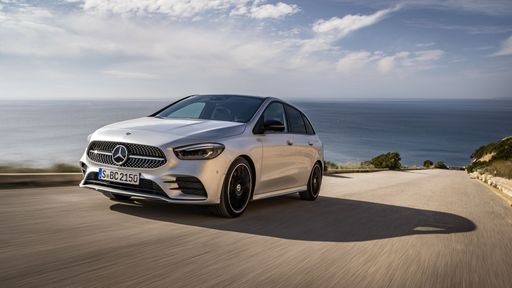
Mercedes B Class
Mercedes B Class
The Mercedes B-Class is a smart, grown-up compact people carrier that dresses everyday practicality in a near‑premium polish, perfect for buyers who want comfort and a classy badge without the theatrics. It won’t set your pulse racing on a back road, but it will make school runs, commutes and grocery hauls feel pleasantly civilized — a reliable, slightly posh companion for real life.
details
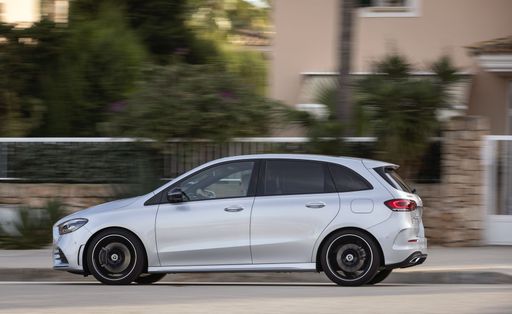
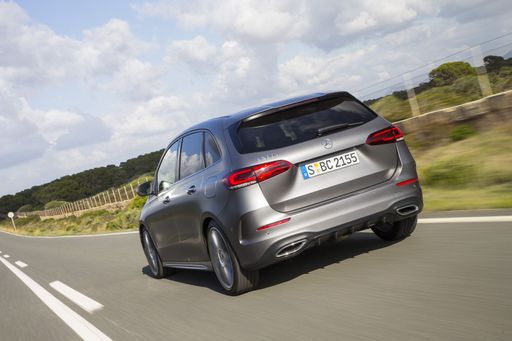
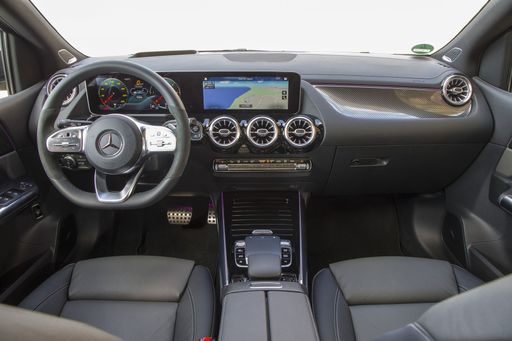
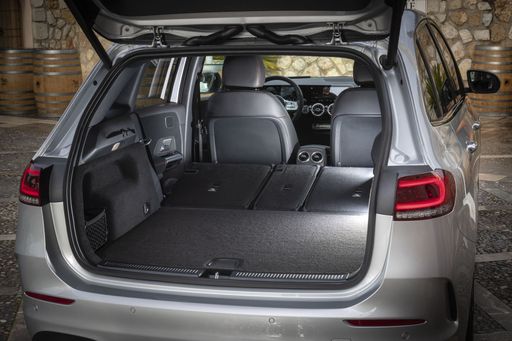
Nissan Juke
The Nissan Juke is a pocket-sized crossover that refuses to blend in, with quirky styling and a cheeky stance that turns heads at every traffic light. It’s ideal for shoppers who value personality and nimble urban driving over maximum practicality, delivering surprising pep and a well-equipped feel for everyday fun.
details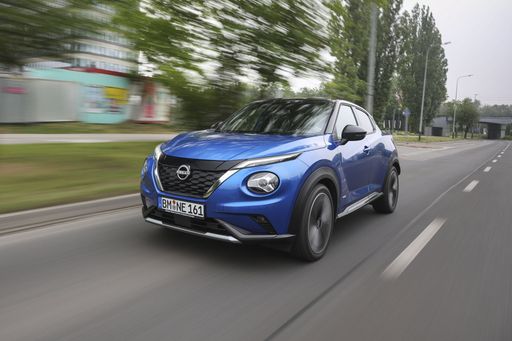
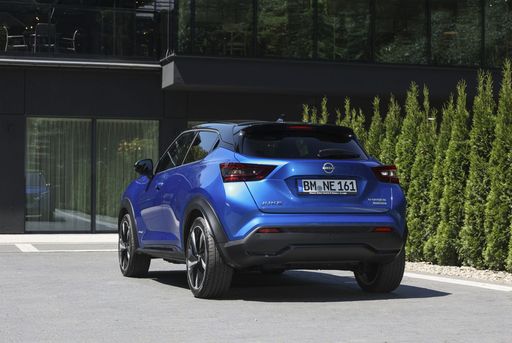
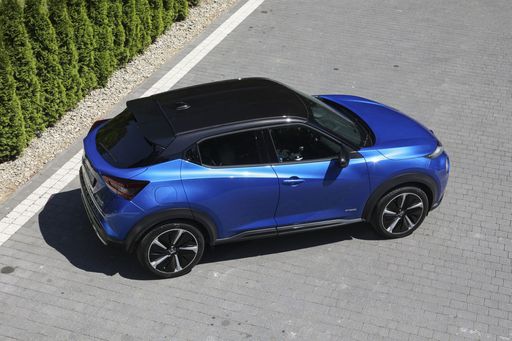

Costs and Consumption |
|
|---|---|
|
Price
33100 - 52500 £
|
Price
21400 - 30100 £
|
|
Consumption L/100km
2.5 - 6.9 L
|
Consumption L/100km
4.7 - 6 L
|
|
Consumption kWh/100km
-
|
Consumption kWh/100km
-
|
|
Electric Range
83 km
|
Electric Range
-
|
|
Battery Capacity
12.90 kWh
|
Battery Capacity
0.60 kWh
|
|
co2
56 - 156 g/km
|
co2
107 - 136 g/km
|
|
Fuel tank capacity
35 - 51 L
|
Fuel tank capacity
46 L
|
Dimensions and Body |
|
|---|---|
|
Body Type
MPV
|
Body Type
SUV
|
|
Seats
5
|
Seats
5
|
|
Doors
5
|
Doors
5
|
|
Curb weight
1405 - 1745 kg
|
Curb weight
1274 - 1405 kg
|
|
Trunk capacity
405 - 455 L
|
Trunk capacity
354 - 422 L
|
|
Length
4419 mm
|
Length
4210 mm
|
|
Width
1796 mm
|
Width
1800 mm
|
|
Height
1562 mm
|
Height
1593 mm
|
|
Max trunk capacity
1440 - 1540 L
|
Max trunk capacity
1237 - 1305 L
|
|
Payload
505 - 550 kg
|
Payload
405 - 427 kg
|
Engine and Performance |
|
|---|---|
|
Engine Type
Plugin Hybrid, Petrol MHEV, Diesel
|
Engine Type
Petrol, Full Hybrid
|
|
Transmission
Automatic
|
Transmission
Manuel, Automatic
|
|
Transmission Detail
Dual-Clutch Automatic
|
Transmission Detail
Manual Gearbox, Dual-Clutch Automatic, Automatic Gearbox
|
|
Drive Type
Front-Wheel Drive, All-Wheel Drive
|
Drive Type
Front-Wheel Drive
|
|
Power HP
116 - 238 HP
|
Power HP
114 - 143 HP
|
|
Acceleration 0-100km/h
6.5 - 10 s
|
Acceleration 0-100km/h
10.1 - 11.8 s
|
|
Max Speed
200 - 250 km/h
|
Max Speed
166 - 180 km/h
|
|
Torque
200 - 450 Nm
|
Torque
200 Nm
|
|
Number of Cylinders
4
|
Number of Cylinders
3 - 4
|
|
Power kW
85 - 175 kW
|
Power kW
84 - 105 kW
|
|
Engine capacity
1332 - 1991 cm3
|
Engine capacity
999 - 1598 cm3
|
General |
|
|---|---|
|
Model Year
2024 - 2025
|
Model Year
2024
|
|
CO2 Efficiency Class
B, D, E, F
|
CO2 Efficiency Class
D, E, C
|
|
Brand
Mercedes-Benz
|
Brand
Nissan
|
What drivetrain options does the Mercedes B Class have?
The Mercedes B Class is offered with Front-Wheel Drive or All-Wheel Drive.




